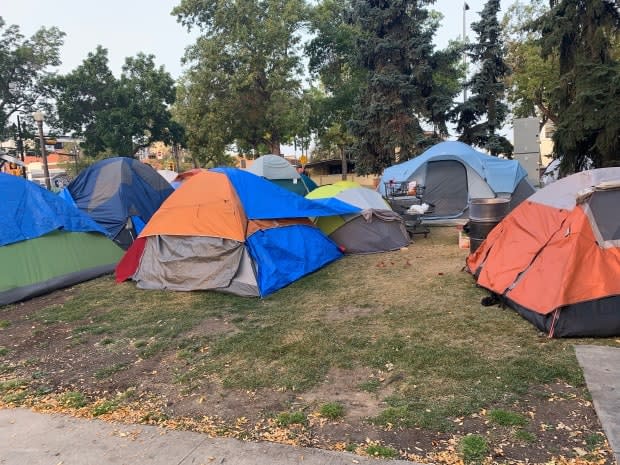Edmonton mayor flags homelessness as key issue for next council to address

Outgoing Mayor Don Iveson admits the homelessness situation in Edmonton needs a lot of work, as 1,000 more people have become homeless since the beginning of the COVID-19 pandemic.
That's up from an estimated 1,600 people in March, 2020, who considered themselves without a home, according to Homeward Trust and the city's affordable housing and homelessness branch.
Iveson blames the provincial government for its lack of investment in mental health and addictions support.
"Not having a willing partner on social policy objectives around housing and vulnerable people, for example, is driving a huge amount of cost for us here," Iveson said during a news conference Friday.
Supportive housing is one of five priority areas Iveson has outlined in a series of transition memos he posted this week to help guide the next council.
The other four memos, posted online for the public to read, involve energy transition, the city plan, regional economic development and fiscal policy.
"The [supportive housing] memo lays out what some of the gaps are, what some of the opportunities are working with a federal government that is well aligned on this issue and a provincial government that quite frankly, is not," Iveson said.
He's optimistic about transitional housing in the works through the federal rapid housing initiative. The city will use the funding to convert hotels into supportive units.
But social support related to mental health and addictions treatment and counselling are under the province's health-care jurisdiction.
A key point in Iveson's memo on supportive housing suggests building up the relationship with the federal government.
He points to a new working group between Canadian municipalities and Ottawa to co-design solutions on housing.
"This group is getting its legs under it, but it represents a significant opportunity to continue to collaborate to fund new and better ways to accomplish shared goals," Iveson says in the memo.
Addressing homelessness is a top priority for many Edmontonians, as the CBC found out during polls commissioned ahead of the municipal election.
Iveson hopes the contents of his memos will fuel discussion and debate among candidates running for city council, policy makers in the city and regional mayors.
"I'm very happy to see if there's constructive disagreement," he said. "It provides a bit of a factual floor of what's actually been ongoing and some suggestions about future possibilities."
Pandemic challenges
The city has faced many challenges during the COVID-19 pandemic amid infrastructure cuts from the province, and the goal to keep property taxes level, Iveson said.
The city projects an overall COVID-related shortfall of $75 million in 2022.
Transit has taken a big hit during the pandemic, with ridership on buses and LRT down to about half of pre-pandemic levels and not expected to bounce back until 2024.
The city expects a $50 million shortfall in transit revenues in the next two years.
The next council will need to consider committing $100 million a year estimated to implement the Energy Transition Strategy.
Mayoral candidates
Eleven people are running to replace Iveson, including three former city councillors, Kim Krushell, Michael Oshry, Amarjeet Sohi.
Coun.Mike Nickel is also in the race and did not attend a mayoral candidates' forum Thursday, hosted by the Edmonton Downtown Business Association.
At the forum at Rogers Place, Oshry and Krushell said the next mayor and council need to mend the relationship with the province and keep party politics out of city business.
'The City of Edmonton has been fighting with the province for years now," Oshry said. "We need to fix that disastrous relationship."
Cheryll Watson, a mayoral candidate, and former vice president of the Edmonton Economic Development Corporation, said she'd look for common ground through mutual respect.
"I propose to use some of my experience and practice around resetting the partnership with our provincial and federal government," Watson said.

 Yahoo Movies
Yahoo Movies 